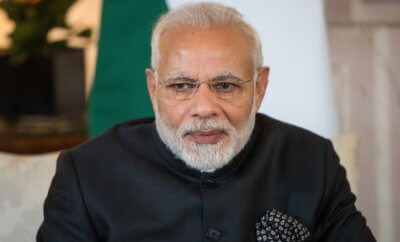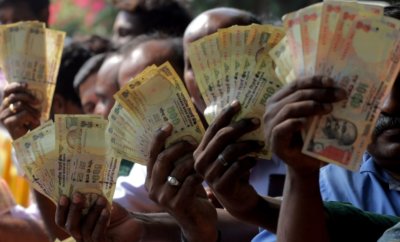Business
India Ranks 62 on World Economic Forum’s Inclusive Development Index

Emblem of the World Economic Forum in Davos, Switzerland
Bigstock
India ranks below Pakistan and China on the Inclusive Development Index, released by the World Economic Forum ahead of the Davos summit.
India ranks 62nd among emerging economies on the Inclusive Development Index, falling from its last year’s ranking of 60th, according to a report released on Jan. 22 by the Geneva-based World Economic Forum. The rank is also much below that of its neighbors, with China taking the 26th spot while Pakistan is at 47th place.
The index was released ahead of the annual WEF meeting in Davos, which will be attended by several world leaders, including Indian Prime Minister Narendra Modi and U.S. President Donald Trump.
Last year, India was ranked 60th among 79 developing economies while China and Pakistan occupied the 15th rank and 52nd position, respectively.
The index looks at the “living standards, environmental sustainability and protection of future generations from further indebtedness,” according to the WEF. The organization asked the leaders to urgently move to a new model of inclusive growth and development as relying on GDP as a measure of economic achievement is fueling short-termism and inequality, PTI reported.
The 2018 index takes into account the progress of 103 economies on three individual pillars — growth and development; inclusion; and inter-generational equity. The report has been divided into two parts — part one covering 29 advanced economies and the second one including 74 emerging economies. In the three pillars of the index, India ranked 72nd for inclusion, 66th for growth and development and 44th for inter-generational equity.
The index has also classified the countries into five sub-categories in terms of the five-year trend of their overall Inclusive Development Growth score: receding, slowly receding, stable, slowly advancing and advancing. While India has a low overall score, the country is among the 10 emerging economies with ‘advancing’ trend.
Norway is once again the world’s most inclusive advanced economy while Lithuania tops the list of emerging economies. In advanced economies, Ireland comes close on the heels of Norway, followed by Luxembourg, Switzerland and Denmark making up the top five. Small European economies make up rest of the top 10, with the only non-European country on the list being Australia at the 9th rank.
Of the G7 economies, Germany (12) ranks the highest. It is followed by Canada (17), France (18), the United Kingdom (21), the United States (23), Japan (24) and Italy (27). Among emerging economies, the top five are Lithuania, Hungary, Azerbaijan, Latvia and Poland.
The report points out that while China ranks first among emerging economies in GDP per capita growth (6.8 per cent) and labor productivity growth (6.7 per cent) since 2012, its overall score is brought down by lackluster performance on inclusion. Decades of prioritizing economic growth over social equity has led to historically high levels of wealth and income inequality and caused governments to miss out on a virtuous circle in which growth is strengthened by being shared more widely and generated without unduly straining the environment or burdening future generations, the WEF observed.
Excessive reliance by economists and policy-makers on Gross Domestic Product as the primary metric of national economic performance is part of the problem, it added.




You must be logged in to post a comment Login